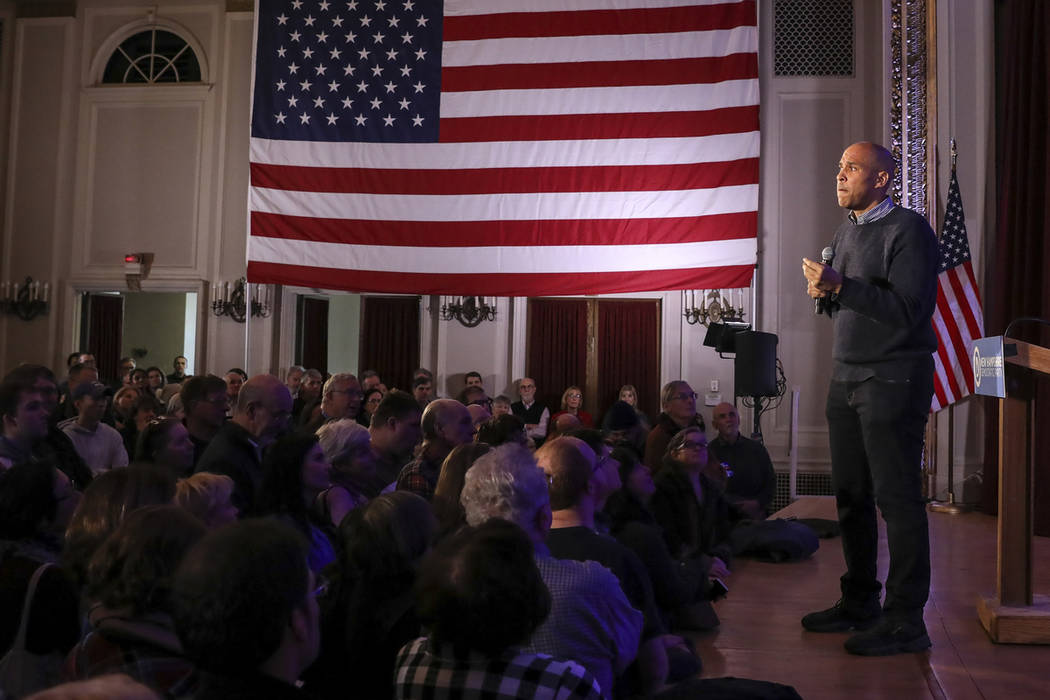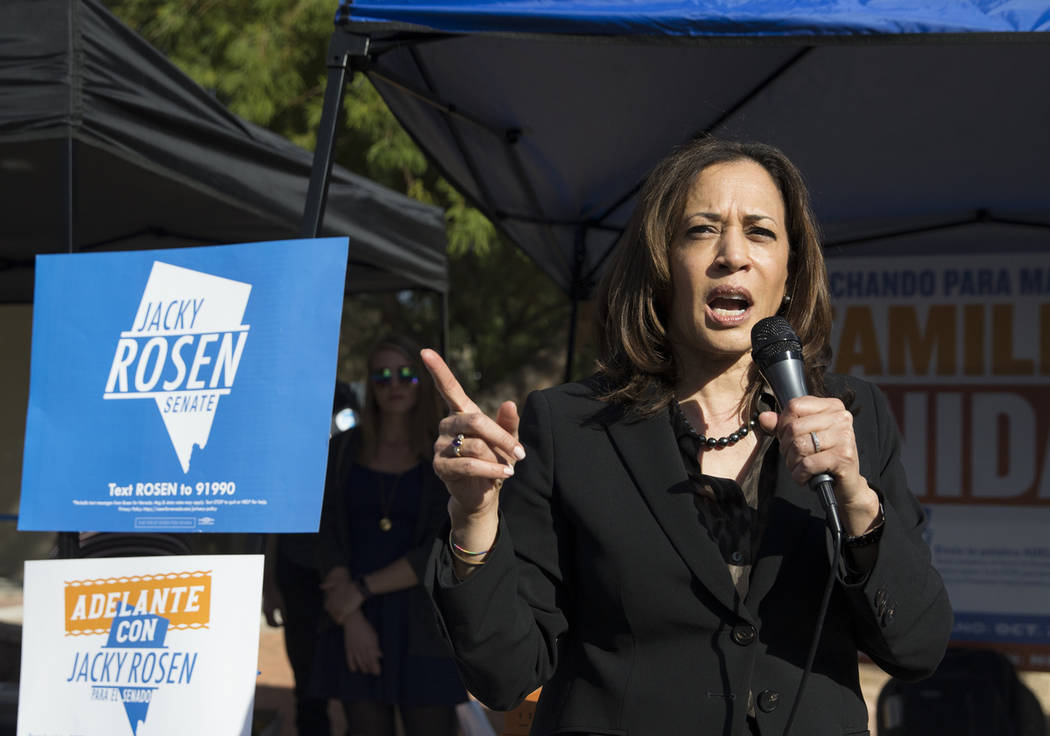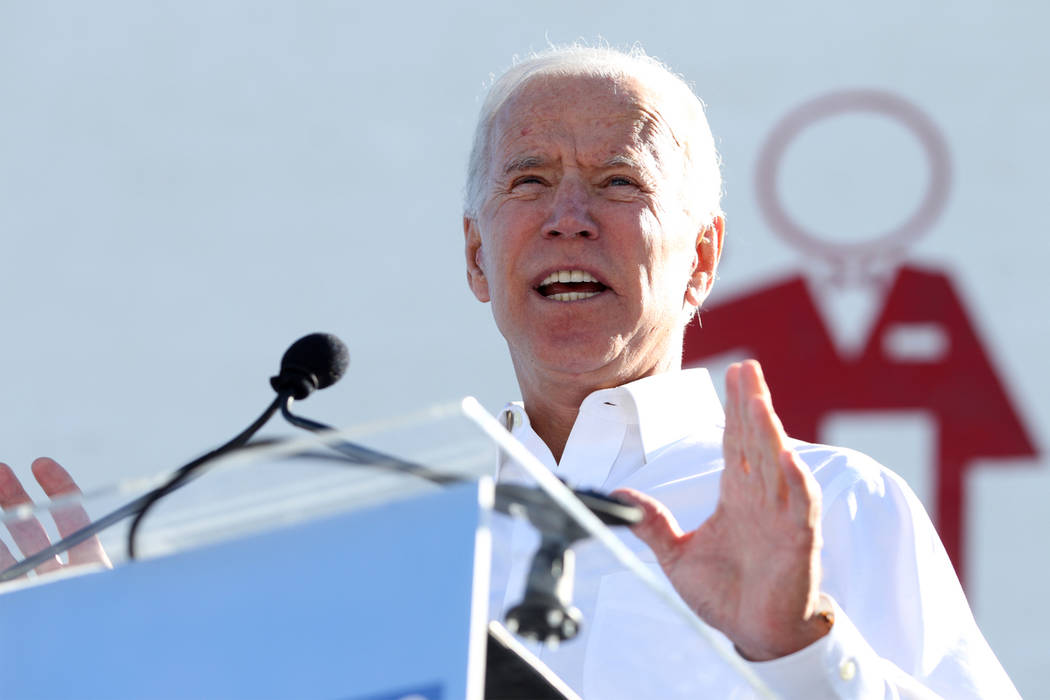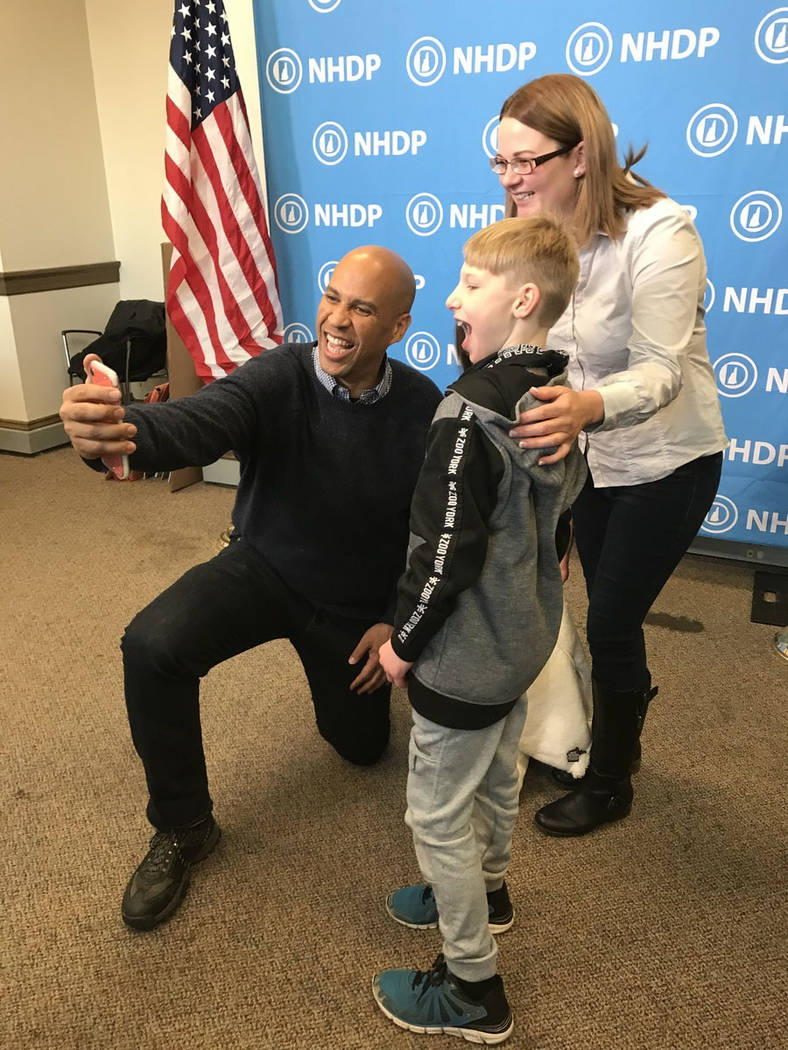Nevada’s political clout grows thanks to early presidential caucus




MANCHESTER, N.H. — Just a month after the midterm elections, dozens of Democrats trudged across New Hampshire to celebrate, and begin laying the groundwork for the 2020 presidential race.
With a large field of Democrats expected to seek the party’s nomination, all eyes will soon focus on states with presidential contests — Iowa and New Hampshire, and then South Carolina and Nevada, which has grown in stature and clout with its early position on the political calendar.
“Nevada is a key player,” said Sen. Catherine Cortez Masto, D-Nev., during an interview in Washington.
She said Nevada now helps set the field of potential White House hopefuls with its “first in the West” status.
Indeed. Many of the Democrats expected to launch a bid for the White House and challenge President Donald Trump helped stump for Democratic candidates in Nevada before the midterm election, like New Jersey Sen. Cory Booker.
Booker was the only politician entertaining a presidential bid invited to the New Hampshire Democratic Party celebration in December, where he pitched his message of unity — two years before the presidential race.
He met with volunteers and grassroots Democrats who will be instrumental in a candidate’s run for the White House.
In New Hampshire, grassroots organizers and volunteers, in both major political parties, take their duty to help select a nominee seriously.
“I’ve only seen my fourth candidate,” said Susan Ladmer of Peterborough. By 2020, Ladmer said she will “have met every candidate.”
In 2016, Ladmer kicked the tires, so to speak, before she became part the steering committee for Bernie Sanders, the Vermont senator who lost the Democratic nomination to Hillary Clinton.
Nevada before Super Tuesday
Before the midterm, Booker was in New Hampshire and 24 other states, including Nevada, helping candidates and organizers turn out votes in the weeks before the election.
Other Democratic presidential hopefuls also trekked through Nevada, which is scheduled to hold its caucuses after New Hampshire and before the first Super Tuesday event, with delegate-rich California in the mix.
Iowa, New Hampshire and Nevada are holding contests just weeks apart, and a visit by any politician is viewed as a sign of White House ambitions in 2020. It’s never too early in New Hampshire.
“Over the next year New Hampshire returns to the spotlight,” Sen. Jeanne Shaheen, D-N.H., told the state’s Democrats at the New Hampshire Institute of Art.
Shaheen said a candidate can’t just come into the state and spend millions of dollars on advertising and win. They have to meet and interact with voters. “We put the candidates through their paces.”
And the top candidates who emerge from Iowa and New Hampshire must then go to the first presidential contest in the West.
Nevada advanced its contests in 2008, a move engineered by Senate Majority Leader Harry Reid, to increase the state’s political clout.
Cortez Masto said candidates who survive Iowa and New Hampshire “have an opportunity in Nevada to make a difference and show they are ready to play on a national stage.”
Nevada has also seen the benefits of its early place on the calendar.
The state’s position in the presidential races has boosted turnout, Cortez Masto said, and placed a spotlight on local issues, like the Yucca Mountain nuclear waste repository project.
If a candidate wants to win in Nevada, she said “they are going to have to be against Yucca Mountain.”
The state gives candidates a chance to speak to a population that resembles a microcosm of the country. Nevada has growing Latino and Asian communities, a significant African-American population, organized labor, urban, suburban and rural voters with varying degree of education.
“If you come into Nevada with a message that resonates with all those groups,” Cortez Masto said, then as a candidate you are positioned to speak to “the country no matter where you go.”
Organizing in Iowa, New Hampshire
Early organizing has largely been confined to Iowa and New Hampshire.
Republican Ohio Gov. John Kasich appeared in New Hampshire just a week after the midterms. Kasich challenged Trump for the GOP nomination in 2016.
Trump is already raising millions for his re-election.
And a recent Granite State Poll by the University of New Hampshire, taken before the midterm election and the recent economic wobbles of Wall Street, found 83 percent of Republicans here approved of Trump.
Similarly, the poll showed Democrats disapprove of Trump. Overall, the poll showed 44 percent of state respondents approved of the president, 50 percent disapproved and 6 percent were unsure. The poll’s margin of error was plus or minus 3.9 percentage points.
Democrats eyeing a run for president have started measuring support and organizing in the early states, with most candidates expected to make a decision on whether to run after the holidays.
Like New Hampshire and Iowa, Nevada saw several potential candidates before the midterm election.
In addition to Booker, Sen. Kamala Harris, D-Calif., former Housing Secretary Julian Castro of San Antonio and former Vice President Joe Biden, all campaigned for congressional Democrats and Rep. Jacky Rosen, the Democrat who dispatched incumbent GOP Sen. Dean Heller.
Early polls show Biden and Sanders, an Independent from Vermont, with the highest name recognition in Iowa.
Democratic field wide open
But for grassroots supporters in early states, like Ladmer in New Hampshire, the field is wide open. And after the success in November, Democrats see an opportunity.
During his speech to New Hampshire Democrats, Booker never mentioned the president by name, and his message was one of unity and support for each other to accomplish a greater good for all.
Booker told reporters later that he didn’t mention the president by name because he didn’t want the speech to be about Trump. And he reminded reporters that 50 million people voted for Trump for president, including “many of our” family members and friends.
“His supporters are good people,” Booker said.
A decision on whether to run for the presidency would be made after the holiday season, Booker said, but he was clearly buoyed by the opportunity to address Democratic grassroots activists who will be needed in a campaign.
For some Democrats, like Kevin Fleming, a high school teacher attending the event, the answer about a Booker candidacy was clear.
Fleming pointed out Jim Demers, one of former President Barack Obama’s campaign co-chairmen in the state. Demers escorted Booker to New Hampshire events over the weekend.
Fleming thought that a significant pairing, and he noted that Booker had a theme that was similar to the hope and change that Obama campaigned on in 2008.
After his speech to the New Hampshire Democrats, Booker said his message was that the “lines that divide us are no larger than the ties that bind us.”
“I want to pull this country back together,” Booker said.
Contact Gary Martin at gmartin@reviewjournal.com or 202-662-7390. Follow @garymartindc on Twitter.
2020 primary schedule
The caucus and primary calendar for 2020 is not firm yet, and the schedule may change as states and parties make their final decisions. For now, the early schedule looks like this:
Feb. 3 — Iowa caucuses
Feb. 11 — New Hampshire primary
Feb. 22 — Nevada Democratic caucuses
Feb. 29 — South Carolina Democratic primary
March 3 — Super Tuesday primaries in at least nine states including Texas and California.
SOURCE: Election Central














